 | |
Finland | China |
|---|---|
Finnish-Chinese relations are the foreign relations between Finland and China.
 | |
Finland | China |
|---|---|
Finnish-Chinese relations are the foreign relations between Finland and China.
Along with Sweden and Denmark, Finland was one of the first Western countries to recognize the People's Republic of China and form diplomatic relations with the country in 1950. [1] The embassy in Beijing was opened in April 1952, and the first resident Finnish ambassador to China, Helge von Knorring, presented his letter of credence to Mao Zedong on 9 May 1952. [1]
Later that same year, an economic department headed by Olavi J. Mattila was opened at the embassy to foster the development of trade relations. As a consequence, Finland became the first capitalist country to sign a bilateral trade agreement with the People's Republic of China in 1953. [1]
These steps, as well as Finland's staunch support for PRC's membership in the UN, formed a solid basis to the nations' relations well into the 1980s. [1] Since the early 1990s, there has been at least one official minister-level state visit from Finland to China each year. [1]
In June 2020, Finland openly opposed the Hong Kong national security law. [2]
Finland and China have had an agreement on economic, industrial, scientific and technological co-operation since 1973, and the agreement was last revised in 2005. [1] The two principal trade organizations between the countries are Finland-China Trade Association and the China Council for Promotion of International Trade (CCPIT).[ citation needed ]
One of the fastest growing areas of trade between the two countries is in environmental protection and information technology. [3]
China and Russia are suspected of large-scale spying of the IT networks at the Finnish Ministry for Foreign Affairs. The spying focused on data traffic between Finland and the European Union, and is believed to have continued for four years. The spying was uncovered in spring 2013, with the Finnish Security Intelligence Service (Supo) investigating the breach. [4]
In March 2024, Finnish police stated that China's Ministry of State Security via the APT31 hacking group breached the Parliament of Finland in March 2021. [5]
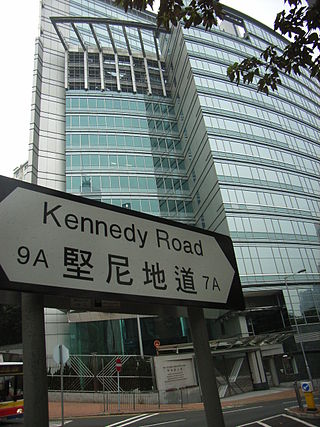
Under the Basic Law, the Hong Kong Special Administrative Region is exclusively in charge of its internal affairs, whilst the central government of China is responsible for its foreign affairs and defence. As a separate customs territory, Hong Kong maintains and develops relations with foreign states and regions, and plays an active role in such international organisations as World Trade Organization (WTO) and the Asia-Pacific Economic Cooperation (APEC) in its own right under the name of Hong Kong, China. Hong Kong participates in 16 projects of United Nations Sustainable Development Goals.

The diplomatic foreign relations of the United Kingdom are conducted by the Foreign, Commonwealth and Development Office, headed by the Foreign Secretary. The prime minister and numerous other agencies play a role in setting policy, and many institutions and businesses have a voice and a role.
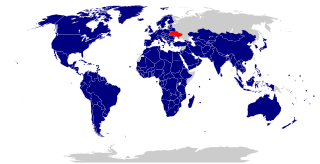
Ukraine has formal relations with many nations and in recent decades has been establishing diplomatic relations with an expanding circle of nations. The foreign relations of Ukraine are guided by a number of key priorities outlined in the foreign policy of Ukraine.

Belize maintains 14 embassies to foreign countries, one consulate, and three missions to international organizations. In 1990, Belize became a member of the Organization of American States, and the Commonwealth of Nations in 1981.
The Government of China is engaged in espionage overseas, directed through diverse methods via the Ministry of State Security (MSS), the Ministry of Public Security (MPS), the United Front Work Department (UFWD), People's Liberation Army (PLA) via its Intelligence Bureau of the Joint Staff Department, and numerous front organizations and state-owned enterprises. It employs a variety of tactics including cyber espionage to gain access to sensitive information remotely, signals intelligence, human intelligence as well as influence operations through united front activity targeting overseas Chinese communities and associations. The Chinese government is also engaged in industrial espionage aimed at gathering information and technology to bolster its economy, as well as transnational repression of dissidents abroad such as supporters of the Tibetan independence movement and Uyghurs as well as the Taiwan independence movement, the Hong Kong independence movement, Falun Gong, pro-democracy activists, and other critics of the Chinese Communist Party (CCP). The United States alleges that the degree of intelligence activity is unprecedented in its assertiveness and engagement in multiple host countries, particularly the United States, to which various US officials contend economic damages, prosperity and stolen innovations have resulted in $US320-445 billion annually since its inception and activities.

Chinese-United Kingdom relations, more commonly known as British–Chinese relations, Anglo-Chinese relations and Sino-British relations, are the interstate relations between China and the United Kingdom.

Under the Basic Law, Macau's diplomatic relations and defence are the responsibility of the central government of China. Except diplomatic relations and defence, nonetheless, Macau has retained considerable autonomy in all aspects, including economic and commercial relations, customs control.

Consular relations between China and Australia were first established in 1909, and diplomatic relations were established in 1941. Australia continued to recognise the Republic of China (ROC) government after it lost the Chinese Civil War and retreated to Taiwan in 1949, but switched recognition to the People's Republic of China (PRC) on 21 December 1972. Chinese Australians have been a significant minority group in the country since the Qing dynasty.
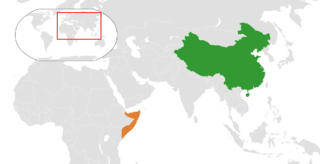
China–Somalia relations are the bilateral relations between China and Somalia. Somalia maintains an embassy in Beijing. China has an embassy in Mogadishu. It is led by Ambassador Fei Shengchao.

Hong Kong–United States relations are bilateral relations between Hong Kong and the United States.

The China–New Zealand relations, sometimes known as Sino–New Zealand relations, are the relations between China and New Zealand. New Zealand recognised the Republic of China after it lost the Chinese Civil War and retreated to Taiwan in 1949, but switched recognition to the People's Republic of China on 22 December 1972. Since then, economic, cultural, and political relations between the two countries have grown over the past four decades. China is New Zealand's largest trading partner in goods and second largest trading partner in services. In 2008, New Zealand became the first developed country to enter into a free trade agreement with China. In recent years, New Zealand's extensive economic relations with China have been complicated by its security ties to the United States.
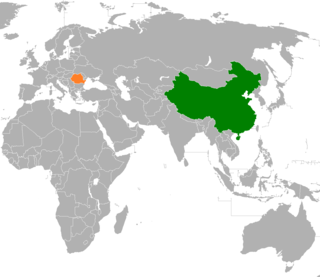
The Kingdom of Romania and Republic of China (ROC) began relations on July 5, 1939.

China–Lithuanian relations are the bilateral foreign relations between the People's Republic of China (China) and Lithuania. The PRC has a chargé d'affaires in Vilnius. In December 2021, Lithuania closed its embassy in Beijing.
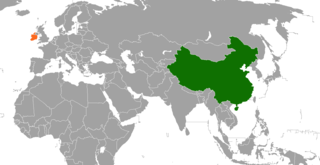
China–Ireland relations are interstate relations of China and Ireland. Ireland and China first established their bilateral foreign relations after they signed the Communique on the Establishment of Diplomatic Relations on 22 June 1979. This milestone opened the gate for trades, businesses, politics, education, and tourism between the two countries; both nations have gained enormous growth of economic values. Both countries exchanged ambassadors in 1980. Ireland has an embassy in Beijing, a general consulate in Shanghai and an honorary consulate in Hong Kong; China has an embassy in Dublin. The first historical meeting for the two headers of China and Ireland governments took place in November 1996 when Premier Li Peng met with Taoiseach John Bruton at the World Food Summit. By 2019, this bilateral relationship has boomed to a high point, and a ceremony of their 40th anniversary of diplomatic relations was held in Dublin, Ireland in June 2019.
A de facto embassy is an office or organisation that serves de facto as an embassy in the absence of normal or official diplomatic relations among countries, usually to represent nations which lack full diplomatic recognition, regions or dependencies of countries, or territories over which sovereignty is disputed. In some cases, diplomatic immunity and extraterritoriality may be granted.

Antigua and Barbuda–China relations refer to bilateral relations between China and Antigua and Barbuda. Antigua and Barbuda has an embassy in Beijing. China has an embassy in St. John's. Diplomatic relations were established on January 1, 1983, less than two years after the Caribbean nation's independence, under Deng Xiaoping and Prime Minister Vere Bird, respectively. Diplomatic relations between the two countries have been smooth since then, as China supported Antigua and Barbuda's bid to join the United Nations.

Belgium–China relations began in the early 1970s about 20 years after mainland China came under communist rule. China has an embassy in Brussels whilst Belgium has an embassy in Beijing and consulates in Guangzhou, Hong Kong and Shanghai.

China–Sweden relations are the bilateral relations between China and Sweden. Sweden was the second Western country to establish official diplomatic relations with the People's Republic of China, on 9 May 1950.

China – Luxembourg relations officially established in 1949 and began on November 16, 1972.
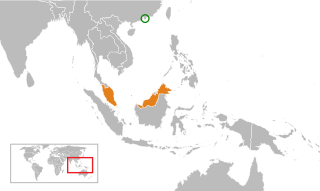
Hong Kong–Malaysia relations refers to bilateral diplomatic relations between Hong Kong and Malaysia.
{{cite web}}: CS1 maint: archived copy as title (link)